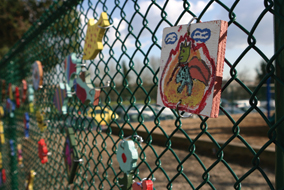
UBC students helped encourage positive communication through fence art at Strathcona Elementary - photo by Chloe Lewis UBC Reports | Vol. 53 | No. 8 | Aug 9, 2007
Scratching Beneath the Surface
More Courses Adopt Community Service Learning
By Sarah Walker
This coming year, up to 600 students will have the opportunity to be part of new UBC-Community Learning Initiative (UBC-CLI) courses. The Faculty of Land and Food Systems, the Faculty of Arts and the Department of Civil Engineering will each offer a course using community service learning (CSL) as a central pedagogical tool, thanks to newly allocated funds available to support faculty. In addition, a variety of other courses will offer CSL projects during February’s Reading Week.
CSL is a model of experiential learning that combines voluntary community service with classroom learning. UBC-CLI was recently formed to help the University reach its Trek 2010 goal of developing programs that engage 10% of UBC students in CSL each year. In the UBC-CLI approach to CSL, students work in teams on short-term projects that link to course content and meet the goals of the participating organizations.
What differentiates CSL from volunteering experience alone is the embedded critical reflection. Margo Fryer, Director of the Learning Exchange and the UBC-CLI and Assistant Professor in the School of Community and Regional Planning, explains that reflection on the community experience -- for example, through journal writing or small group dialogue -- generates more powerful and effective learning and allows students to scratch beneath the surface. “Students say this kind of real-life experience is what they’ve been missing in their education,” says Fryer. “They’re making a difference in these projects, and learning about themselves and society.”
The first wave of UBC-CLI projects, launched in February 2007, saw almost 200 undergraduate students work with 14 community organizations on 23 different projects, including one at UBC Okanagan. Sherina Kanani, a third-year sociology student, and her team worked with YWCA’s Munroe House, a second-stage safe house for battered women in Vancouver. To help smooth the transition to more independent housing, the team initiated a catalogue of housing alternatives across the city. Over three days, the team prepared a template of pertinent questions and researched about 20 properties, making notes on the houses, neighbourhoods and available amenities. Back in the classroom, the participants wrote reflective papers on the experience and presented their project to the class.
“Those were the three longest days of my life,” says Kanani. “They challenged me in more ways than just time. Doing something that is actually going to be used is really important and exciting.” She hopes to find more CSL opportunities this fall and says she is likely to volunteer in the future. In fact, one student on her project team is now a regular volunteer at Munroe House.
This is the reaction Fryer hopes CSL will evoke. “The beauty of these kinds of projects is there’s something quite magical about students working in teams and the immersion experience,” says Fryer. “People often think three to four days is too short to have an impact, but our experience shows it is enough.”
To prove the point, Fryer and Walter Sudmant, Director of UBC’s Planning and Institutional Research (PAIR), conducted a survey of students in courses offering a CSL option. Those who participated in CSL options reported significantly higher levels of active and collaborative learning.
The broader UBC community is part of the picture too. UBC-CLI and Human Resources offer a program where staff, graduate students and alumni act as Project Leaders in the UBC-CLI. This will become part of a community leadership certificate, a new professional development opportunity. Brown bag lunches, open to the entire UBC community, also start up this fall at UBC’s Department of Teaching and Academic Growth (TAG). These aim to stimulate discussion around issues related to the integration and evaluation of CSL in academic courses.
UBC-CLI’s work is made possible by a grant from the J.W. McConnell Family Foundation.
To find out more, visit www.learningexchange.ubc.ca
or contact Margo Fryer at 604.822.1602.
|
